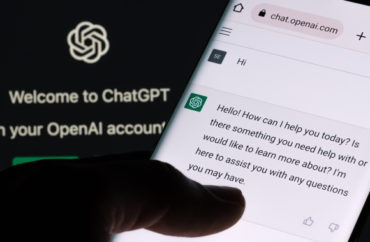
As the emerging prolific use of artificial intelligence, or AI, continues to gain a foothold among the nation’s college students, some argue they should use caution, as too much reliance on the technology could damage their ability to think critically and reason.
“The brain is like a muscle. Using AI enables it to atrophy from disuse,” Dr. Timothy Cordes, an addiction and technology expert, told The College Fix in a recent interview.
“If you use AI consistently, then, when you need to actually think, it’s like getting off the couch after a year of eating Ding-dongs and trying to go for a run,” he said. “In that case, it would be easier to just fall back on the crutch of AI.”
Students are busy and so will often jump for the easier path sometimes without considering the consequences. Cordes said that may not be prudent: “Thomas Edison said in all seriousness, ‘There is no expedient to which a man will not resort to avoid the labor of thinking’…and he never even dreamed of AI.”
While AI is a real temptation for students, as it is easily accessible and simple to use, a March 2 piece by Professor Andrew Moran and Dr. Ben Wilkinson urged caution.
Having AI write the essay does not benefit the student, so it is the same as the professor not assigning the paper; the essay is still written, but the student misses out on the learning process, the two argued.
“When we ask AI to write an essay, we are not simply outsourcing labour, we are outsourcing our thinking and its development, which over time will only render us more confused and less intelligent,” they wrote in their Guardian op-ed, titled “Students’ use of AI spells death knell for critical thinking.”
Additionally, Dr. Cordes pointed out in his interview, using and relying on AI too much means students “may not have the critical thinking skills to judge AI’s output.”
Even some students have sounded the alarm to their peers.
A recent op-ed that appeared in the Michigan Daily by student Anna Sperry headlined “Exercise the brain, logout of ChatGPT” argued that when “students go to ChatGPT instead of working through and breaking down questions, they deny themselves an opportunity to struggle through and the satisfaction of solving a problem.”
“Without this crucial cognitive process, individuals are at a disadvantage because generative AI does the work for them. Students must be proactive with the rise of AI by finding the balance between using the resource for academic growth and academic dependence,” she wrote.
A 2024 paper published in Smart Learning Environments found that an over-reliance on AI systems “affects students’ cognitive abilities.”
“Our findings indicate that over-reliance stemming from ethical issues of AI impacts cognitive abilities, as individuals increasingly favor fast and optimal solutions over slow ones constrained by practicality,” according to the article.
MORE: Students earn As on tests, essays with ChatGPT artificial intelligence
IMAGE CAPTION AND CREDIT: Images of ChatGPT homescreens / Ascannio, Shutterstock
Like The College Fix on Facebook / Follow us on Twitter






Please join the conversation about our stories on Facebook, Twitter, Instagram, Reddit, MeWe, Rumble, Gab, Minds and Gettr.